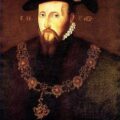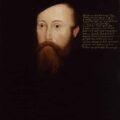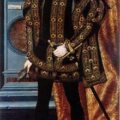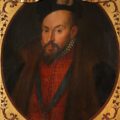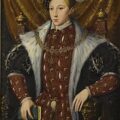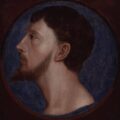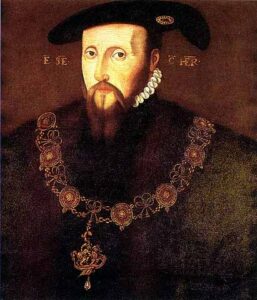
The famous Tudor chronicler Charles Wriothesley recorded his execution:-
“Fryday, the 22 of January 1552, Edward Seimer, Duke of Somersett, was beheaded at Tower Hill, afore ix of the clocke in the forenone, which tooke his death very patiently, but there was such a feare and disturbance amonge the people sodainely before he suffred, that some tombled downe the ditch, and some ranne toward the houses thereby and fell, that it was marveile to see and hear; but howe the cause was, God knoweth.”
There is a note on that page of The Chronicle explaining that “Edward VI appears to have been perfectly convinced of his uncle’s guilt, and in that conviction to have given himself no further concern about the duke, only noting in his diary that ‘the Duke of Somerset had his head cut off upon Tower Hill between eight and nine o’clock in the morning.’ ” How sad! Edward VI had now lost both of his uncles, Edward and Thomas Seymour, to the executioner for alleged treason.
Edward Seymour was laid to rest in the Chapel of St Peter ad Vincula at the Tower of London and records show that he was actually buried next to Anne Boleyn in the chancel area.
You can read all about Edward Seymour’s arrest and the reasons for it in my article The Arrest of Edward Seymour, Duke of Somerset and Lord Protector
Notes and Sources
- A Chronicle of England during the reigns of the Tudors, from A.D. 1485 to 1559, Charles Wriothesley, printed for the Camden Society, p65-66
Also on this day in history…
- 1554 – Thomas Wyatt the Younger met with fellow conspirators at his home of Allington Castle in Kent to make final plans for their uprising against Mary I and her decision to marry Philip of Spain – see Wyatt’s Rebellion 1554
- 1561 – Birth of Francis Bacon, Viscount St Alban, the Elizabethan Lord Chancellor, politician, philosopher, author and scientist at York House in the Strand, London. Bacon is known as “the Father of the Scientific method” and developed an investigative method, the Baconian method, which he put forward in his book “Novum Organum” in 1620. Some people (Baconians) believe that Francis Bacon was the true author of William Shakespeare’s plays.
